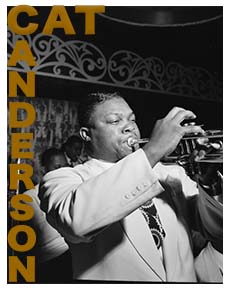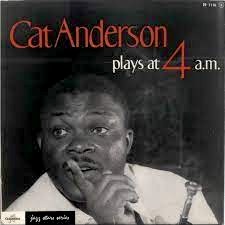
Trumpeter William Alonzo “Cat” Anderson was born in Greenville September 12, 1916. Both of his parents died by the time he was 4 years old and Anderson was sent to the Jenkins Institute For Children, an orphanage in Charleston. The Jenkins orphanage was established as a home for orphaned African American boys in 1891. Expert musical instruction was given to the boys, and the Jenkins band became the first Black instrumental group organized in South Carolina. The school band was widely renowned and and travelled widely in Europe and the US.
Cat Anderson cut his first records with a small combo of Jenkins alumni called the Carolina Cotton Pickers. After leaving that group he performed with several noteworthy artist like Erskine Hawkins, Lucky Millinder, and Lionel Hampton. In 1944 he joined Duke Ellington’s orchestra, where he remained, off and on, until 1971.
Cat Anderson recorded ten full-length records under his own name, as well as dozens of others with many of the most legendary names in jazz; Charles Mingus, Ella Fitzgerald, Lionel Hampton, and Ellington. He was known throughout jazz circles for his great versatility and his ability to play with great tone and clarity in the highest octaves, known as “altissimo.”

Cat Anderson Plays At 4 a.m., 1958.
Anderson’s first record as a bandleader was released only in France by Columbia Jazz, a French imprint of Columbia domestic. It features performances of Elllington’s Black and Tan Fantasy and standards like Ain’t Misbehavin’ recorded in Paris with Americans Russell Procope (clarinet), Jimmy Woode (bass), Sam Woodyard (drums), and Frenchman Georges Arvanitas (piano).
